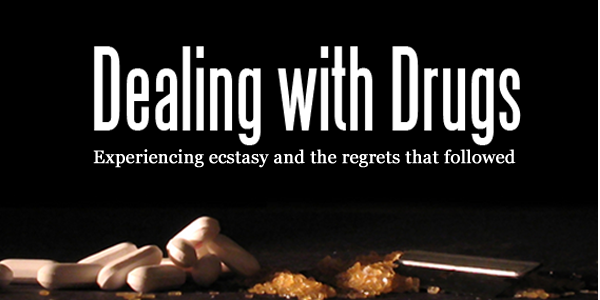[from the archive] Senior Sophia Miller* looks at herself in the mirror. A look of disgust comes across her face. Her stomach growled, but she knew eating wouldn’t have any effect on her. She shudders to think about what had happened the night before. She knows it was a night that she would regret.
At a party over the summer, Miller decided to take MDMA (3,4-methylenedioxymethamphetamine), which is also known as ecstasy. MDMA has stimulant and psychedelic properties and is often taken for the feelings of well-being, stimulation and the distortions in time and sensory perception.
“I thought it was a normal thing to do, and I didn’t think it was a big deal,” Miller said. “It wasn’t my best experience, but I’ve learned to accept my mistakes since then.”
MDMA can cause a dangerous increase in body temperature that can lead to kidney failure, it can also cause an increase in heart rate and blood pressure. In humans, the research is not conclusive at this time, however, a number of studies show that long term, heavy MDMA users suffer cognitive deficits, including problems with memory. MDMA can affect the brain by altering the activity of chemical messengers, or neurotransmitters, which enable nerve cells in the brain to communicate with one another.
MDMA can produce confusion, depression, sleep problems, drug craving and severe anxiety.These problems can occur soon after taking the drug or sometimes even days or weeks. Miller experienced many of the short term side effects including insomnia, raised blood pressure, high body temperature and discomfort. However, since she had only one experience with the drug, she doesn’t think she has been effected by the long term side effects.
“I didn’t think of the side-effects when I took it,” Miller said. “It didn’t matter to me at the time, but looking back, I wish I would have done things differently.”
Researchers have determined many ecstasy tablets contain not only MDMA but also a number of other drugs or drug combinations that can be harmful as well. Adulterants found in MDMA tablets purchased on the street include methamphetamine, caffeine, over-the-counter cough suppressants, the diet drug ephedrine and cocaine.
Pediatrician Toribio Garcia believes adults should enter into dialogue with teens about drug abuse and should be prepared to discuss consequences both medical; and legal resulting from illicit drug use. If an adult is fearful of or unable to frankly discuss the issues, health care providers, school counselors, clergy and coaches may be asked to counsel teens.
“Parents should never dismiss early signs of drug abuse,” Dr. Garcia said. “In today’s society too many families are raising “latch-key” children who come home each afternoon to an empty house. Remember an idle brain is the devil’s workshop.”
MDMA exerts its primary effects in the brain on neurons that use the chemical (or neurotransmitter) serotinin to communicate with other neurons. The serotonin system plays an important role in regulating mood, pain aggression to sexual activity.
“Growing up in the 2000’s is indeed difficult for todays young population,” Dr. Garcia said. “To achieve an ‘identity’, false sense of superiority and increased self-esteem to gain popularity or acceptance in certain social circles, children turn to “fun-seeking” activity and other risk taking behaviors.”
According to the 2004 National Survey on drug use and health, more than 11 million people have tried MDMA at least once. MDMA is taken orally, usually in a tablet or capsule, and its effects last approximately three to six hours. The average reported dose is one to two tablets, with each tablet typically containing between 60 and 120 milligrams of MDMA.
“Since that night I have not done it again. I made a huge mistake that is one one my biggest regrets,” Miller said. I’ve changed since then and never want to be in that place again.”
*Name has been changed



